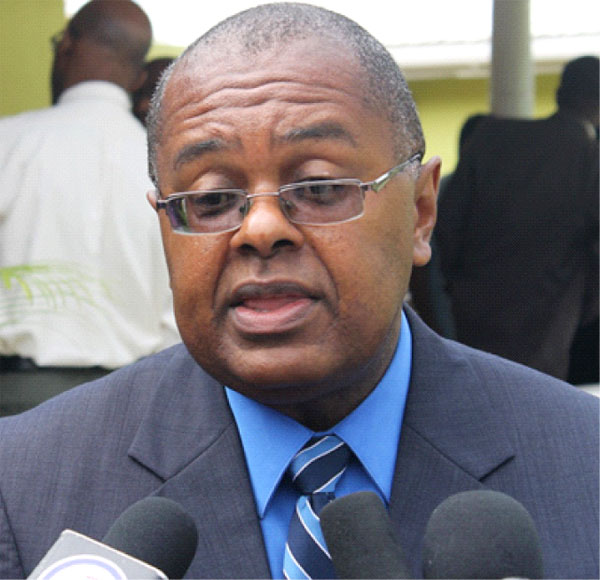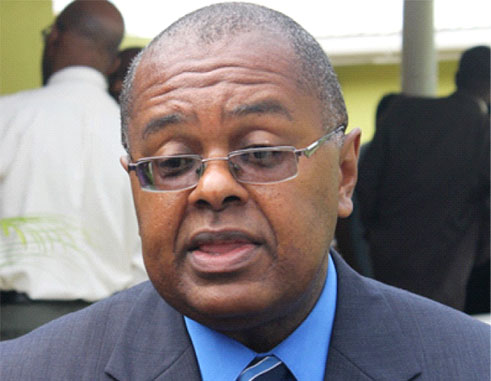Minister Rallies Support To Counter Disasters

FOR many people, the subject of climate change and its associated effects might not seem a pressing need to address. However, that mindset often changes whenever a natural disaster strikes.
The important subject was the focus of a three-day expert group meeting held at Bay Gardens Hotel last week under the theme, “Enhancing the Science – Policy Interface in SIDS”. The meeting was organized by the UN Department of Economic and Social Affairs, Division for Sustainable Development (DSD) and the OECS Commission.
The objectives of the meeting that drew experts from across the world were:
• Taking stock of the current state of science-policy interface in the context of small island developing states (SIDS) and providing a valuable input to the sub-chapter on SIDS in the 2015 edition of the Global Sustainable Development Report (GSDR), and
• Exploring means to strengthen this interface to advance the implementation of the SAMOA Pathway. The sustainable development goals (SDGs) and the sustainable development of SIDS in the context of the post-2015 development agenda.
Minister for Sustainable Development, Energy, Science and Technology, Dr. James Fletcher, gave the feature address at the official opening and articulated Saint Lucia’s position relative to getting the requisite funding to address its vulnerability issues.
Speaking to the media afterwards, Dr. Fletcher said Saint Lucia and countries in the Pacific, Indian Ocean and the Caribbean have a very strong culture of indigenous and local knowledge. He which has helped farmers in deciding when it’s best to plant crops so they crops would be resistant to diseases and grow to required heights. Fishers, he added, also know exactly where to fish to realize greater yields. This timeless and strong culture of indigenous knowledge, the Minister said, has been built up through observation that very often gets taken for granted.
“My address to the meeting was (about) how we can use that traditional knowledge with the science to see how the science can validate it,” Dr. Fletcher said, “These are things that have been tested and observed over many years and I believe they are in some instances even stronger than science. So for the man on the street, it’s not just how we look at science but how we’re connecting the traditional knowledge that’s been passed on to us.”
Dr. Fletcher said that as is the case elsewhere in the world, the Caribbean has gone through its own cycles of pain caused by natural disasters. He cited Hurricane Ivan in Grenada that wiped out over 200% of that nation’s GDP in 2004, as well as Hurricane Tomas in Saint Lucia in 2010 which wiped out over 50% of our GDP. He said close attention needs to be placed on the pattern as well as the efforts needed to build resilience.
“We also had the Christmas Eve trough in which six people died and millions of dollars’ worth of destruction,” Dr. Fletcher said. “So it’s very clear that our small island developing states are being visited by more extreme weather events and that we are constantly on a cycle of repair and recovery. We never ever recover and then we have to be repairing again.”
Dr. Fletcher said the warnings remain very clear, adding that “it’s up to us to heed them”. However, he challenged the developed world to provide the kind of support needed since SIDs cannot do it all on their own.
“The magnitude of the response that is required and the magnitude of the interventions that are required to develop resilience are beyond the capacities of our respective budgets,” Dr. Fletcher said. “So we need the assistance of the developed world to help us get through this.”
The Minister said the data collected from the discussions will inform all involved in identifying where areas of resilience need to be developed, including how homes need to be built. He said places that are flood-prone today did not suffer from the current amount of flooding and damages prior to the deforestation that made way for agricultural and residential purposes. Dr. Fletcher said a 1 in 50- or 100-year event is now becoming more frequent as 1 in 10-year events.
“So I think this allows us to make better use of that information so that we can plan, for example, how we build, as well as give us some early warning systems that we can put in place so we can see when levels in our rivers are rising to the point where we believe they may be flooding so we can evacuate people. We cannot cut down on the occurrence of tropical storms but we can prepare for them and develop greater resilience,” the minister explained.







